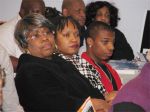Weeks after the incident, community groups are continuing to gather in response to the alleged beating of 18-year-old Jordan Miles by three Pittsburgh police officers. Recently groups such as the Black Political Empowerment Project, NAACP and Community Empowerment Association have united to move forward with concrete steps to ensure incidents like this do not continue.
 |
| FAMILY TIES—Jordan Miles, right, attended the meeting with his mother and grandmother.
|
“This is hard work because there are so many obstacles to justice. The system is not in our favor. The police are given deep deference in the courts because the police have a very difficult job to do,” said B-PEP Chairman Tim Stevens. “I have not a piece of doubt the incident with Jordan Miles will be the spark that creates change.”
At a community forum hosted by B-PEP, the American Civil Liberties Union and the Pittsburgh Interfaith Impact Network on March 15, law professionals from Duquesne University and the University of Pittsburgh helped determine what actions the public can take to combat incidents of police injustice.
One recommendation was that the Pittsburgh Police become accredited. They also said it was important that data on police interactions be more readily available to the public and encouraged the audience to begin recording every incident where they feel their rights were violated.
“We’re urging that if the police stop and frisk an individual that be reported,” Stevens said. “That’s going to make them think twice before harassing people.”
Tracey McCants Lewis, acting director of clinical legal education at Duquesne, illustrated how best to interact with police and made sure the audience was aware of their rights when being stopped by the police.
“When you’re stopped by police you should be calm and respectful because you don’t want them to get agitated. You have to control your emotions. Don’t argue with the police. I know it might be hard,” Lewis said. “We’ve all heard of incidents where people run and they get shot in the back. They ran; they weren’t posing a threat. Don’t run.”
Lewis said it’s much easier to fight for a person whose rights have been violated if they acted appropriately during the incident. She said always try to get the officer’s badge number and go to the hospital immediately if you have been injured.
“My reason for giving this presentation is I want people to be safe,” Lewis said. “We need police to be accountable, but we also need to be good citizens.”
David Harris, a law professor at the University of Pittsburgh and nationally recognized racial profiling expert, explained how unfair practices actually deter crime reduction and hinder the police’s ultimate goal to keep communities safe.
“When you use race to predict who can be involved in crime, what actually happens is the police get fewer bad guys,” Harris said. “Profiling is used as a short cut. When we do that, we take our eye off the ball. We get less guns off the street we get less dope off the street.”
Harris said history has shown communities have less crime when residents have developed a partnership with police officers.
“We cannot as citizens make the streets safe by ourselves and they can’t do that,” Harris said. “If people feel they are under threat it erodes the relationship that is so hard to develop.”
Also in attendance was Miles’ family along with Miles’ friend, DaMarra Underwood, who led the outcry of students from the Pittsburgh Public High School for the Creative and Performing Arts. Underwood said the school has implemented curriculum about student rights in their history classes.
“I think it’s very important that the students know their rights,” Underwood said. “Because of Jordan now they are educated about this.”